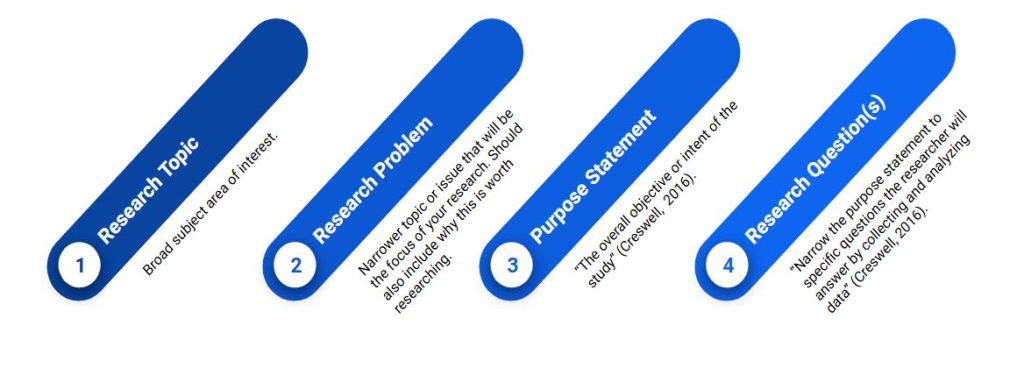7 Research Questions
Learning Objectives
In this chapter, we’ll discuss the importance of establishing focused research questions before you begin your study to provide a clear roadmap for your work. Specifically, we’ll:
- Define a process for developing effective research questions
- Distinguish between types of research questions
- Identify elements of appropriate research questions
What’s in a Research Question?
The first step of a research project is to clearly define the research questions the study will investigate. The research questions determine the scope of the project, define a target population who will become the subject of inquiry, and ultimately determine which methods of research and analysis are appropriate. Ensuring that research questions are conceptually clear and specific is a foundational step that grounds the project and provides direction for the work ahead (DeCarlo, 2018).
Research questions have a specific objective, which ranges from explaining to describing (Sheppard, 2020; DeCarlo, 2018).
In general, research questions:
- Are written in the form of a question.
- Are clear and focused.
- Cannot be answered with, “Yes” or “No.”
- Have more than one possible answer.
- Explore relationships among multiple concepts.
Grounding Questions in Purpose
It is often helpful to situate your research in a broader context before you start writing your research questions. This helps you work from mushy to focused while keeping your project connected to the purpose you hope to achieve. This process is visually depicted below.

First, you’ll start with naming the broad topic that your research will focus on, such as “lake recreation.” Next, you’ll narrow this broad topic to a specific problem serving as the focus of your research – let’s try “barriers to participating in lake recreation.” In this example, my purpose might be something like “identifying factors that facilitate or impede equal access to enjoyment of recreational activities at the lake.” This helps me finally arrive at a focused research question: What factors limit Muskegon residents’ access to recreational activities at Muskegon Lake?
Elements of a Research Question
After narrowing the research topic to the central research question, keep these four suggestions for writing research questions in mind: Example: How does the distance of a respondent’s residence from Muskegon Lake affect how often they visit?
- Begin the question with how, what, or why
- State the core idea, or phenomenon, that you want to investigate
- Identify the population of interest, from whom the data was collected
- Identify the research site, or place the study was conducted
Remember that you are writing a research question, not a statement. Your research question is not “best management practices,” but it might be, “Which residents in the Pigeon River watershed use best management practices?” As we’ve already established, you’ll also need to take care in your choice of words to focus your question appropriately. This is not the time for wordiness and eloquence. Every word in your research question should be carefully selected to reflect the meaning of your question. Keep your word choice un-fancy (Sheppard, 2020; DeCarlo, 2018)..
However, don’t confuse focused language with conceptual simplicity – your research question needs to be sufficiently complex so as to not be answered with a simple “yes” or “no”. You won’t have an awful lot to say if that’s all it takes to answer your question! In the examples above, I’m not just asking, “Do Muskegon residents visit Muskegon Lake?” I’m asking about relationships between visitation and characteristics of residents, or how and to what extent other factors limit Muskegon Lake visitation. There should be more than one potential answer to your question. Your goal is to evaluate the relationship among several concepts that potential explain the problem you are investigating (DeCarlo, 2018).
Below, you will find examples of problematic research questions and suggestions for how to improve each research question, from Sheppard (2020).
| Problematic Research Questions | Improved Research Question |
Too narrow: How many paramedics were registered in the province of British Columbia in 2017?
|
Less narrow: What factors lead individuals to choose paramedics as professions in British Columbia?
|
Unfocused and too broad: What are the effects of Post-Traumatic Stress Disorder (PTSD) on firefighters in Ontario?
|
More focused: What are the social effects of PTSD on families of firefighters in Ontario?
|
Too objective: How much money does the average downtown Vancouver store spend on security guards?
|
More subjective: What is the relationship between security spending and product loss through theft at downtown Vancouver stores?
|
Too simple: What are municipal governments doing to address the problem of sexism in policing?
|
More complex: What is the relationship between the 2017-2018 publicized incidents of sexism in the RCMP and the number of females applying for entry to police departments in St. John’s, Newfoundland?
|
Summary
Establishing clearly defined research questions at the outset of a study is important for focusing the research and providing direction for the path a project will take. When research questions are too broad, the researcher can become quagmired and lose their sense of purpose. Too narrow, and the researcher can become bored or fail to uncover novel insights. In survey research, the research questions guide who is asked to complete the study, what they are asked, and how the data are analyzed.
References
DeCarlo, M. (2018) Scientific Inquiry in Social Work. Pressbooks. CC-BY-BC-SA 4.0. (https://pressbooks.pub/scientificinquiryinsocialwork/).
Creswell, J.W. (2016). 30 Essential Skills for the Qualitative Researcher. Sage.
Saylor Academy. (2012). Principles of Sociological Inquiry: Qualitative and Quantitative Methods. CC-BY-NC-SA 4.0 (https://saylordotorg.github.io/text_principles-of-sociological-inquiry-qualitative-and-quantitative-methods/index.html).
Sheppard, V. (2020). Research Methods for the Social Sciences: An Introduction. Pressbooks. CC-BY-NC-SA 4.0. (https://pressbooks.bccampus.ca/jibcresearchmethods/).
Empirical questions that can be answered by observable experiences.
